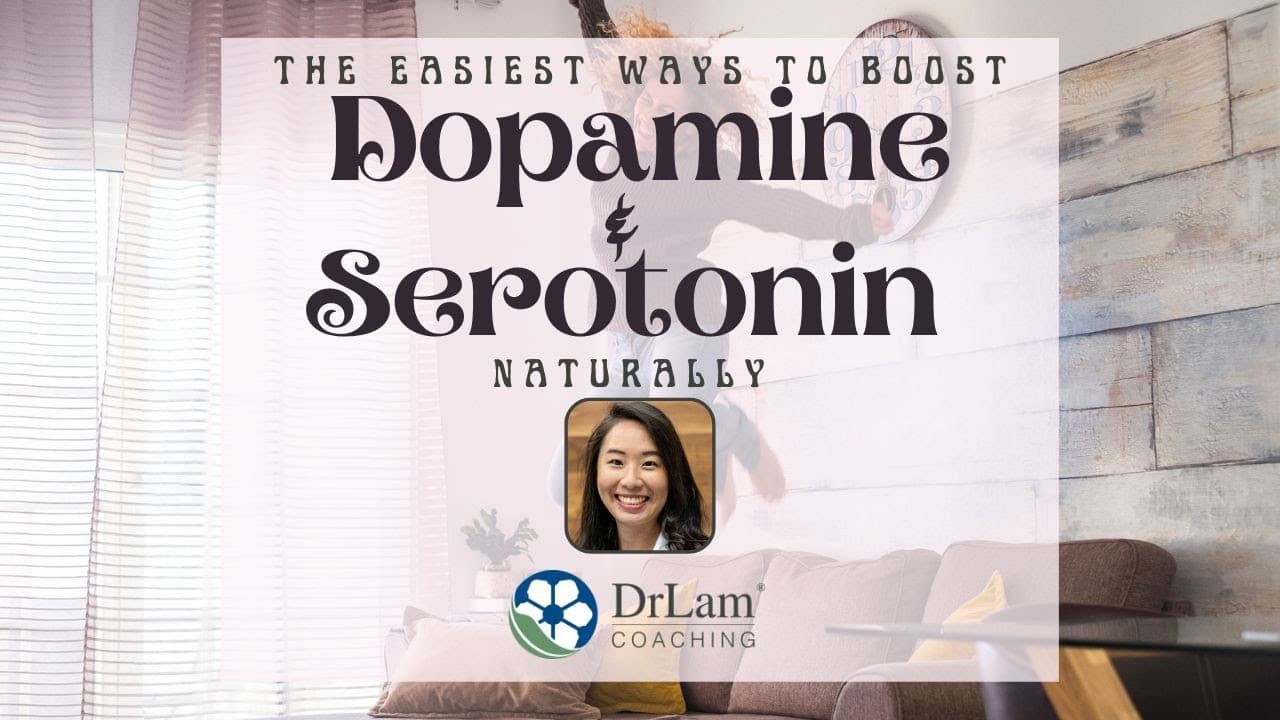
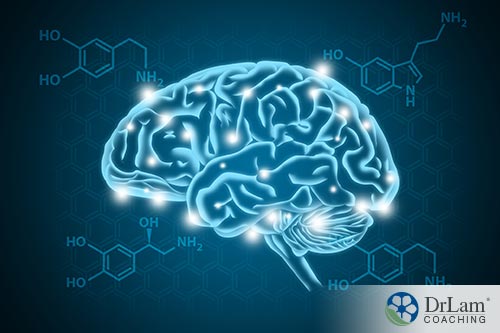 Before we discuss why you should increase dopamine naturally, you need to understand a few things about dopamine. First, it is a neurotransmitter.
Before we discuss why you should increase dopamine naturally, you need to understand a few things about dopamine. First, it is a neurotransmitter.
Your brain contains about 86 billion neurons. They talk to each other using neurotransmitters. Scientists study the effects of dopamine more than the other neurotransmitters because it affects so many aspects of your behavior.
It also plays a part in many illness conditions such as Parkinson’s disease. This particular disease involves the death of cells that produce dopamine.
Produced by relatively few neurons, dopamine can function as either an excitatory or inhibitory neurotransmitter. However, this depends on the type of receptors available.
Basically, dopamine works to keep you motivated. It helps you push forward, stay focused, and concentrate. And your ability to resist impulses and to make plans comes from this neurotransmitter. In addition, it also controls your pleasure and reward center in your brain.
Some of the symptoms of low dopamine will come as no surprise. They include:
A number of psychiatric issues also trace their origins to low dopamine. For example, depression, attention deficit disorder, addictions, and bipolar disorder to name a few.
These low dopamine levels also play a part in the dysfunction of the Neuroaffect circuit of the NEM. It is a catecholamine like epinephrine and norepinephrine. Likewise, it comes from the adrenal glands, so when the adrenals become fatigued, they produce and release less dopamine. This leads to a drop in mood and can develop into depression if the levels of dopamine drop too low. As stress continues and the Neuroaffect circuit becomes dysfunctional, less and less dopamine becomes available and your mood drops more, more depression develops, and you become less functional. Such a drop in mood can lead to lessened motivation to do anything. As this lowered motivation combines with the fatigue felt by people who suffer from AFS, their overall condition deteriorates.
Research with mice showed them to become so lethargic and apathetic that they wouldn’t even eat. Therefore, they starved to death even when food sat in front of them.
Considering the importance of dopamine, you can begin to see the need to increase dopamine naturally.
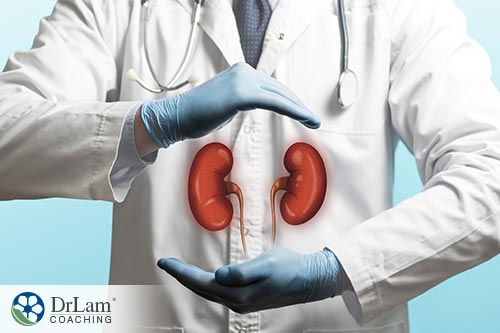 As catecholamines, dopamine, norepinephrine, and epinephrine all come from the same precursor amino acid, tyrosine. Because of this similarity, dopamine tends to follow along with epinephrine and norepinephrine when their levels become excessive. These conditions of excessive epinephrine and norepinephrine are called the Reactive Sympathoadrenal Response (RSR) and the Reactive Sympathetic Overtone (RSO), also known as adrenaline dominance, respectively. These conditions occur as your body strives to deal with the effects of continuing stress. RSR is more severe than RSO due to excess levels of epinephrine that can lead to serious health complications in the cardiovascular system.
As catecholamines, dopamine, norepinephrine, and epinephrine all come from the same precursor amino acid, tyrosine. Because of this similarity, dopamine tends to follow along with epinephrine and norepinephrine when their levels become excessive. These conditions of excessive epinephrine and norepinephrine are called the Reactive Sympathoadrenal Response (RSR) and the Reactive Sympathetic Overtone (RSO), also known as adrenaline dominance, respectively. These conditions occur as your body strives to deal with the effects of continuing stress. RSR is more severe than RSO due to excess levels of epinephrine that can lead to serious health complications in the cardiovascular system.
A number of underlying causes lead to a deficiency of dopamine. And you can address all of them through ways to increase dopamine naturally.
If your diet contains too little protein, you may suffer from lack of L-tyrosine, the amino acid precursor to dopamine. In addition, with poor nutrition, you may also suffer from a lack of essential cofactors required to turn l-tyrosine into dopamine. These cofactors include zinc, iron, B complex vitamins, and copper.
Even if you take multiple supplements, you may take the wrong ones if you want to increase dopamine naturally. So, you should avoid the following:
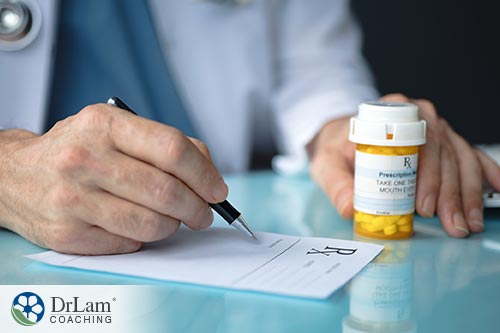 Regarding prescription drugs, a certain category of medications called dopamine agonists works to bind to receptors for dopamine, thus blocking its activity. Included among these:
Regarding prescription drugs, a certain category of medications called dopamine agonists works to bind to receptors for dopamine, thus blocking its activity. Included among these:
A number of drugs used for recreation work through dopamine processing pathways. So, this leads to a sometimes severe up and down level of dopamine in your body. Included among these recreational drugs:
Addictive behaviors and substances such as gambling, recreational drugs, sugar, caffeine, striving for power, porn, video games, shopping, cell phone overuse, and thrill-seeking flood your brain with dopamine. Very high levels of dopamine.
At first glance, this may seem like a good thing. After all, dopamine plays an important part in so many beneficial aspects of your behavior.
But the relatively fragile receptors for dopamine can sustain damage from such an onslaught. In addition, they may even die due to overstimulation.
A protective process called dopamine downregulation may occur in this case. In other words, the receptors for dopamine may become less responsive or even shut down totally.
Exposure on a long-term basis to situations of stress and adversity can lead to a lowered production of dopamine. So this lowered dopamine production may even come from lingering effects of a significantly traumatic childhood. For example, events like suffering from abuse or growing up with an addict can bring on lower production.
Some evidence exists of lower production of dopamine, serotonin, and norepinephrine resulting from the overuse of cell phones. So the electromagnetic radiation coming from your cell phone may be a very unexpected source of low dopamine.
When you increase dopamine naturally, one of two things typically happens. Either you produce more dopamine or the dopamine already in your body becomes better utilized.
So it comes down to these:
In addition to increasing your motivation to get things done, when you increase dopamine naturally you get some extra benefits. These include:
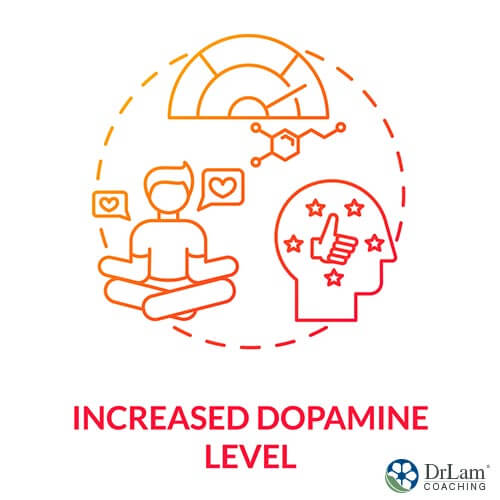 There are numerous ways to increase dopamine naturally. Some of them follow.
There are numerous ways to increase dopamine naturally. Some of them follow.
While little research into dopamine-boosting foods exists, we know of some foods that contain dopamine. These include:
One issue with eating these foods comes to light: The dopamine in foods doesn’t cross the blood-brain barrier. However, you can get around this by eating foods high in L-tyrosine. These foods include:
Certainly, if you’re allergic to any of these foods or any of their ingredients, avoid them.
Fava beans or broad beans contain L-dopa, an amino acid direct precursor to dopamine. Moreover, L-dopa does cross the blood-brain barrier, making it an excellent remedy for Parkinson’s disease.
Drinks that contain caffeine boost the release of dopamine and increase the availability of dopamine receptors. For example, coffee and tea are the most popular of these drinks.
L-theanine, an amino acid found in several teas, gives a feeling of relaxation. It does cross the blood-brain barrier and helps increase levels of dopamine as well as GABA and serotonin in your brain. And it also comes as a supplement.
Large amounts of saturated fat reduce the sensitivity of dopamine receptors. And sugar gives a quick boost to dopamine but ultimately depletes it. However, artificial sweeteners deplete the levels of both dopamine and serotonin.
Eating less overall increases the number of dopamine receptors.
While dopamine supplements don’t exist, quite a few other natural supplements work in various ways to increase dopamine levels. However, keep in mind that increasing dopamine could ramp up your system and make you stimulated. Those with Adrenal Fatigue Syndrome should always ask their provider before starting any of these supplements because it could backfire and cause paradoxical reactions if your body isn't strong enough to handle them.
Consider this supplement first. It readily crosses the blood-brain barrier where its conversion to dopamine takes place. Stress and exhaustion increase your need for this amino acid. So, people who suffer from Adrenal Fatigue Syndrome (AFS) need more. And it also increases your ability to deal with extreme stress.
This amino acid occurs in most foods that contain protein. It works as one of the building blocks of protein. Your body uses it to produce chemical messengers like dopamine.
Foods like blueberries, grapes, and dark chocolate, among others, contain this antioxidant. So they help increase levels of dopamine in the brain.
Taken in low doses, this biochemical helps produce dopamine. And it also fights bacteria and works to relieve depression.
This supplement helps balance dopamine levels and helps create new dopamine receptors in your brain. It can be found in beer, fish, oats, and other foods.
In addition, other supplements like curcumin, ginkgo Biloba, SAM-e, and ginseng also help increase the production of dopamine.
Certain essential nutrients such as vitamins, minerals, and essential fats can help boost dopamine production.
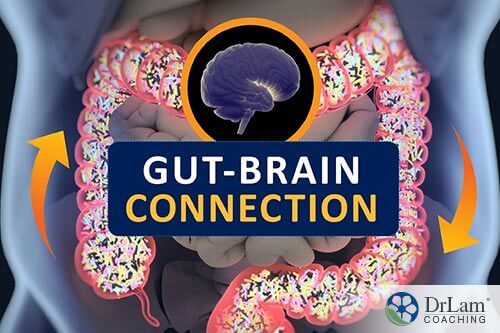 Considering that more than 50% of the dopamine in your body comes from your gut, this relationship appears vital. Clearly, foods containing dopamine and most of the supplements you take that have a positive effect on increasing dopamine naturally go through your gut as they’re digested and absorbed.
Considering that more than 50% of the dopamine in your body comes from your gut, this relationship appears vital. Clearly, foods containing dopamine and most of the supplements you take that have a positive effect on increasing dopamine naturally go through your gut as they’re digested and absorbed.
If your gut functions as it should, this process proceeds normally.
However, those who suffer from AFS often also experience problems with the gut. Chronic stress affects your gut by weakening the normally tight junctions between the epithelial cells that line your gut. Consequently, weakening these junctions leads to a condition called leaky gut. Consequently, this condition allows pathogens, viruses, bacteria, and undigested food particles access to your bloodstream.
Once these products reach your bloodstream, your immune system identifies them as threats to your body. So, this sets in motion an immune reaction that leads to increased inflammation. Inflammation acts as one way the immune system fights against foreign invaders.
So, this condition can worsen and the flood of invaders stimulates your immune system to become hyperactive. As a result, greater amounts of inflammation result, and the immune system may identify healthy cells as invaders as well. As a result, this leads to autoimmune conditions developing.
The added inflammation can become systemic, ending up in the brain. Research indicates inflammation lies at the root cause of many mental health conditions.
In addition, problems with the gut decrease the absorption of vital nutrients. Poor nutrition causes decreased levels of dopamine. And dopamine proves necessary in fighting depression and other mental health problems.
So, problems with your gut can interfere with increasing dopamine naturally due to absorption issues.
A healthy brain must be present in order for your body to remain healthy. However, the brain falls prey to stress in a number of ways. Chronic stress as seen in the NeuroEndometabolic Stress Response can lead to physical changes in the brain, which is a major part of the Neuroaffect circuit. Loss of neurons, loss of essential neurotransmitters and other chemicals, and an imbalance of neurotransmitters all result from chronic stress. This in turn affects the brain, the autonomic nervous system, and also the microbiome. Most people don't know, but your gut microbiome is key to making a majority of the body's neurotransmitters, dopamine just being one of them.
Loss of dopamine in the brain caused by the effects of chronic stress, by poor nutrition brought on by dysbiosis in the gut, and by negative effects of drugs both prescription and recreational leads to significant health and mental health issues.
In addition to the problems mentioned above, dopamine levels in the brain can affect the functioning of the autonomic nervous system. This system controls numerous activities in the brain without conscious thought.
When stress is mild, the ANS releases norepinephrine to counter the effects. If stress continues, more and more norepinephrine enters the body. Therefore, speeding up of the body’s processes as a result. This activation of your body makes it difficult to get the sleep you need to counteract stress. So, this condition sets up yet another source of stress that can become chronic.
Chronic stress depletes dopamine. So, as stress becomes chronic more norepinephrine and epinephrine flood your system. Consequently, this flood results in your body remaining ‘keyed-up’ making sleeplessness ever more likely.
Dopamine, one of the most studied among the other neurotransmitters, works in multiple ways in your body. For example, it helps neurons communicate with each other, gives you the motivation you need to perform at your best, and controls feelings of pleasure and reward.
Relatively few neurons produce dopamine. And chronic stress depletes it. Therefore, those who suffer from AFS or have adverse effects of the NeuroEndoMetabolic Stress Response find themselves with low levels of dopamine and few feelings of success or pleasure.
Increasing dopamine naturally involves eating better, taking supplements that work to increase dopamine or create new receptors, and changing your lifestyle to include getting more exercise and avoiding potentially addictive behaviors.
If you suffer from low dopamine levels, here are a few things you can do to help alleviate the situation:
Whatever course of action you decide to take, however, please do so with the guidance of your healthcare professional who will assess the benefits for you as well as recommending an appropriate dosage or amount to use.
If you have a weak body, supporting strong dopamine function may actually make matters worse. Those with adrenal fatigue are particularly at risk. they are already high in epinephrine, and excessive dopamine may push the body into adrenal crashes, with anxiety, insomnia, heart palpations, dizziness being some of the common symptoms. the weaker the adrenals, the greater the risk.
So, if you would like to know more about or need assistance with any of the above in dealing with low dopamine levels, the team at Dr. Lam Coaching can help. We offer a free** no-obligation phone consultation at +1 (626) 571-1234 where we will privately discuss your symptoms and various options. In addition, you can also send us a question through our Ask The Doctor system by clicking here.
The way to increase dopamine naturally is to improve your nutrition. Eat the right way to generate more dopamine and dopamine receptors. Avoid foods that deplete dopamine. Take the right supplements to increase use of dopamine. Heal your gut to increase production of dopamine.
